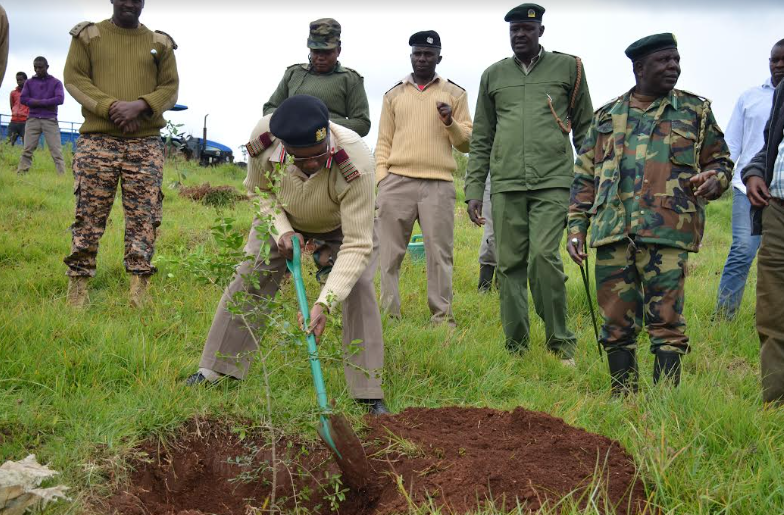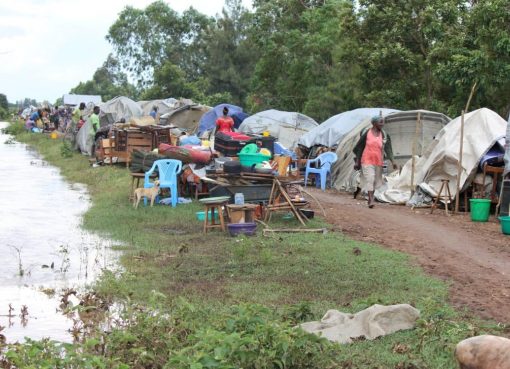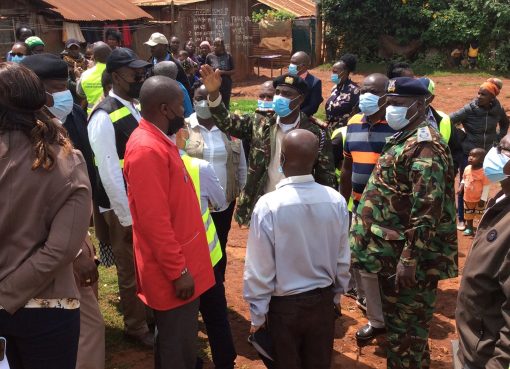The Narok Security team in collaboration with Base Titanium limited and Narok Natural Resources Network has planted over 25, 000 tree seedlings at Sierra Leone part of Maasai Mau forest in Narok South Sub County.
Narok County Commissioner Isaac Masinde who led the planting of 2, 100 trees said the forest is rejuvenating after people were evicted from the land in 2018 and 2019.
Masinde reminded the residents that the forest was a mega water catchment area as some rivers flowing to Lake Victoria and River Nile originate from it. “Once the fencing is complete, there will be very limited access to the forest land. Do not be deceived by politicians who cheat people that they will return them to the forest land if elected in office,” said Masinde.
Over 4 million seedlings have been planted in the forest land since people were evicted and the forest is slowly rejuvenating.
The commissioner lauded different organizations that have volunteered to adapt portions of the forest land to plant trees which has made the work easier.
The government has employed 20 community scouts to man the forest land who control the cutting of grass in the forest land. The community scouts, mostly youth evicted from the forest, create a link between the government and the community by encouraging locals to conserve the environment.
Narok Ecosystem Conservator Safari Opiyo said the tree seedlings were sourced from the communities living around the forest while those contracted to facilitate the planting exercise were people evicted from forestland.
“Over 300 families living near the forest benefited from the tree planting exercise. Those contracted were supposed to plant and tender the seedlings,” said Opiyo.
The conservator observed that Base Titanium has planted over 26 million indigenous tree seedlings since the re-afforestation exercise began. “We choose to use the local community so that they too can benefit from the forest. We have worked with the evictees to plant millions of tree seedlings in various parts of the forest,” he added.
“Some trees will take many years to mature like the Meru Oak. Others take even ten years to germinate. This is the danger of cutting down trees in an indigenous forest,” said Opiyo.
Micah Muema, a representative from Base Titanium said his Kwale based organization adapted 84 acres of forest land to plant trees since last year.
So far, he said, they have planted seedlings in 71 acres and the 13 acres remaining will be planted in the course of the year.
At the same time, Muema said they have been training the communities living around the forest land to set up nursery beds so that they too could benefit from selling the seedlings.
“We make sure we buy the tree seedlings from the local communities so that we can teach them the value of conserving the environment. They feel part of the project and they help in nurturing the seedlings,” he said.
Muema said they have contracted a local organized group dubbed Keroboni Self-Help Group where they buy the seedlings at Sh. 50 each and plant at Sh. 30 each.
“We do not give money to individuals, but instead, we put money in the group’s account. Since we began this project, we have deposited over Sh. 1 million into their account,” he said.
The Narok Natural Resource Network chairman Nicholas Murero lauded the government for the conservation efforts saying since people were evicted from the forest, the water volumes have been on the increase.
He said they will continue partnering with Base Titanium to train the locals on how to prepare a tree nursery bed and help them get the best seedlings that can grow in the environment.
“We are not planning to plant trees in Mau only but also in other parts of the county like the Maasai Mara and institutions to increase forest cover in the county,” he said.
In 2018 and 2019, the government evicted over 5, 000 families from the Maasai Mau forest to reclaim the forest land that had greatly been invaded.
After the evictions, the government commenced the process of putting up a 30-kilometer electrical fence to protect the forest from any future human settlement.
By Ann Salaton




